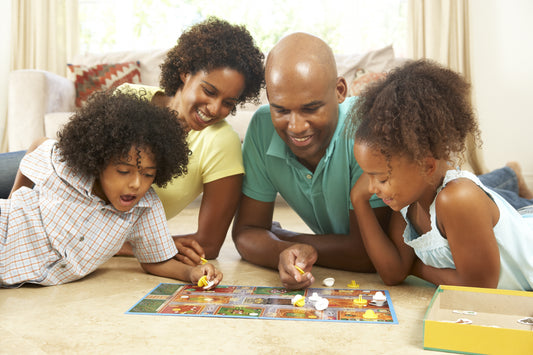Is it worth keeping those board games that are piled in the back of the closet? The answer is a big YES!
It turns out – despite all the digital gaming options available today – that the old-school games are definitely worth hanging on to. This article from Scholastic provides a little insight as to why interactive board games are so important for our kids and why we need to bring family game night back into our lives! Here are a few excerpts from the article. You can read the full blog post here.
Board Games Make Unplugging a New Habit
The lack of technology required to play a board game makes them special. For that reason, board games are a simple way to get some quality, screen-free time with the kids — and you might be surprised by how much they love it.
They Offer Opportunities for Early Learning
Simple games like Candy Land and Hi-Ho! Cherry-O help young players identify colors, count spaces, and even develop hand-eye coordination and dexterity in moving cards and pieces around the board. Plus, learning to wait your turn and follow the rules are important lessons that serve kids far beyond the living room floor.
Board Games Get Older Kids' Brains Buzzing, Too
Board games are an easy way to encourage healthy brain development in older kids and teens. Strategy games, including Clue, Sequence, and card games are useful in helping the frontal lobes of the brain develop.
They Boost Their Language Skills
Board games can be a sneaky way of helping school-aged kids work on skills they’re struggling with. Have a reluctant reader? A round of classic Boggle, Scrabble, or the Bob Books Happy Hats Beginning Reading Game will help him expand his vocabulary and flex his spelling skills.
Board Games Are an Alternative to Time Out
The next time you find yourself going through a rough patch with one of your kids, consider playing a board game together instead of sending him to his room.
In other words, taking turns and practicing patience during a game — even when things don't go their way — can help little ones practice more respectful responses than stomping off and slamming their bedroom door shut.
They Increase a Shrinking Attention Span
Board games, when played without interruptions, can also help lengthen a child's attention span. But to reap the benefits, everyone needs to commit to seeing the game through to the end.
If your family sits down for a game of Chinese checkers, be sure to complete a full game without everyone checking their phone, asking Alexa to play a song, or turning on the TV for the latest football scores. Finishing a board game without interruptions will help lengthen the declining attention span of kids in world filled with digital distractions.
Board Games Soothe Anxiety
They may help anxious kids learn how to navigate friendships more easily. Because they're structured, board games can provide an easier way to build interpersonal relationships with peers, since the child knows what's expected of them.
They Teach the Value of Teamwork
Board games often offer kids meta-messages about life: Your luck can change in an instant, for better or for worse. But in addition to teaching them that nothing is guaranteed, board games are a good way to encourage kids of different ages to team up and work together — something they'll need to do throughout life.
They Show Kids How to Be a Good Loser
They also teach important lessons about playing fair. If you're playing with a child who has low frustration tolerance, and losing is really difficult for them, allowing them to break the rules at first can make the game more tolerable and fun for them. But the goal is often to purposely play by the rules and encourage them to use coping skills and promote resilience when things don't go their way.
That’s why I created Race to the State! I remember as kids playing a card game with my big sister, one I think we just made up. It was lots of fun – we played for hours. It involved being the fastest at slapping our hand down on a card when certain cards were turned over. Even though my big sis was many years older than me, I felt I had a good chance to win because I was really quick. Being younger didn’t matter. And we had fun together!
I had those same fond memories come to mind as I developed Race to the State.
ADMIT IT -
Whether school age or my age,
We are all just big kids!
And we love having fun!
What is more fun than playing a game on the floor?
So, set those electronic games aside, for just a bit.
Get on the floor and slap a state. It’s fun!
But you gotta be quick to win Race to the State!
Oh yeah...and we are all about sneaking in some LEARNING while having some FUN!

